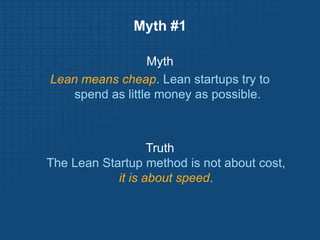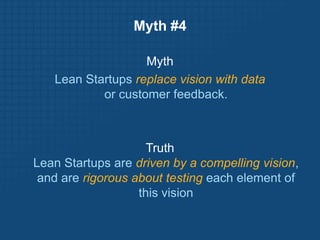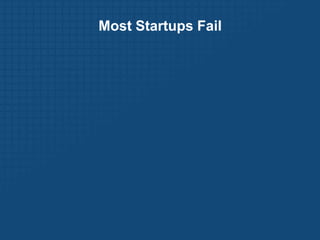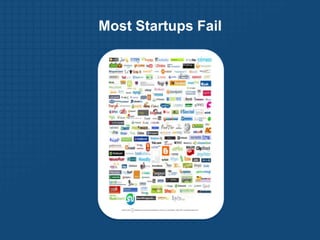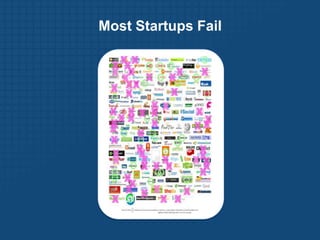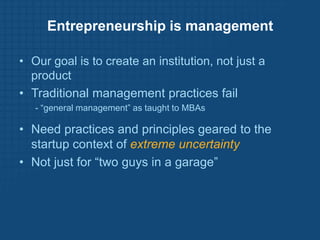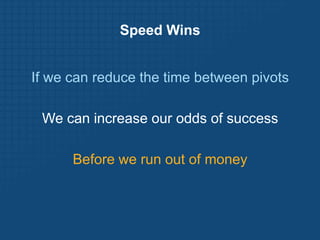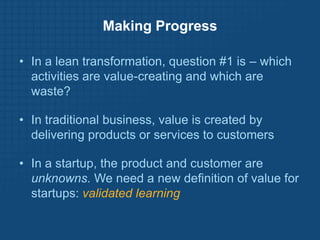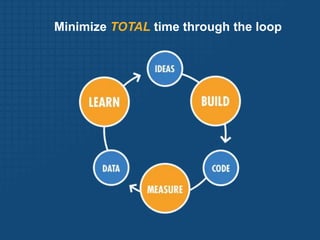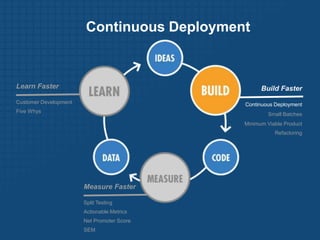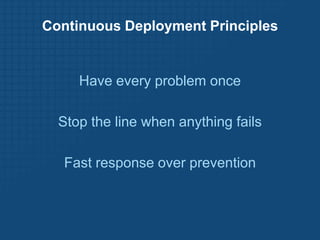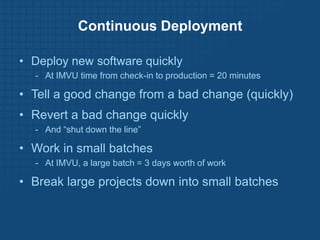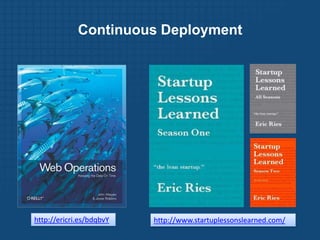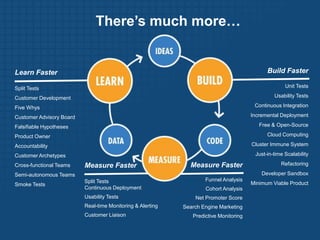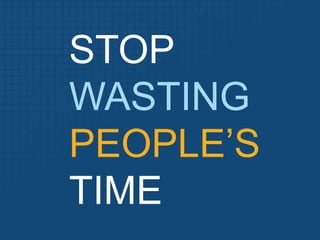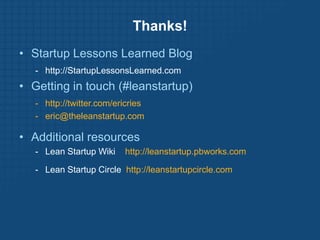2010 10 25 lean startup for wealthfront
- 1. The Lean Startup & Continuous Deployment#leanstartup“Innovation through experimentation”Eric Ries (@ericries)http://StartupLessonsLearned.com
- 4. Myth #1MythLean means cheap. Lean startups try to spend as little money as possible.Truth The Lean Startup method is not about cost, it is about speed.
- 5. Myth #2MythThe Lean Startup is only for Web 2.0/internet/consumer software companies.Truth The Lean Startup applies to all companies that face uncertainty about what customers will want.
- 6. Myth #3MythLean Startups are small bootstrapped startups.Truth Lean Startups are ambitious and are able to deploy large amounts of capital.
- 7. Myth #4MythLean Startups replace vision with dataor customer feedback.Truth Lean Startups are driven by a compelling vision, and are rigorous about testing each element of this vision
- 11. What is a startup?A startup is a human institution designed to deliver a new product or service under conditions of extreme uncertainty.
- 12. Nothing to do with size of company, sector of the economy, or industryWhat is a startup?STARTUP =EXPERIMENT
- 13. Entrepreneurship is managementOur goal is to create an institution, not just a product
- 14. Traditional management practices fail- “general management” as taught to MBAsNeed practices and principles geared to the startup context of extreme uncertainty
- 15. Not just for “two guys in a garage”The Pivot
- 16. I’
- 17. The PivotWhat do successful startups have in common?
- 18. They started out as digital cash for PDAs, but evolved into online payments for eBay.
- 19. They started building BASIC interpreters, but evolved into the world's largest operating systems monopoly.
- 20. They were shocked to discover their online games company was actually a photo-sharing site.
- 21. Pivot: change directions but stay grounded in what we’ve learned. Speed WinsIf we can reduce the time between pivotsWe can increase our odds of successBefore we run out of money
- 22. Making ProgressIn a lean transformation, question #1 is – which activities are value-creating and which are waste?
- 23. In traditional business, value is created by delivering products or services to customers
- 24. In a startup, the product and customer are unknowns. We need a new definition of value for startups: validated learningTraditional Product DevelopmentUnit of Progress: Advance to Next StageWaterfallRequirementsSpecificationsDesignProblem: knownSolution:knownImplementationVerificationMaintenance
- 25. Agile Product DevelopmentUnit of Progress: A line of Working Code“Product Owner” or in-house customerProblem: knownSolution:unknown
- 26. Lean StartupUnit of Progress: Validated Learning ($$$)Customer DevelopmentHypotheses, Experiments,InsightsProblem:unknownData, Feedback,InsightsSolution:unknownAgile Development
- 27. Minimize TOTAL time through the loop
- 28. Continuous DeploymentLearn FasterCustomer DevelopmentFive WhysBuild FasterContinuous DeploymentSmall BatchesMinimum Viable ProductRefactoringMeasure FasterSplit TestingActionable MetricsNet Promoter ScoreSEM
- 29. Continuous Deployment PrinciplesHave every problem onceStop the line when anything failsFast response over prevention
- 30. Continuous DeploymentDeploy new software quickly
- 31. At IMVU time from check-in to production = 20 minutes
- 32. Tell a good change from a bad change (quickly)
- 33. Revert a bad change quickly
- 34. And “shut down the line”
- 35. Work in small batches
- 36. At IMVU, a large batch = 3 days worth of work
- 37. Break large projects down into small batchesCluster Immune SystemWhat it looks like to ship one piece of code to production:Run tests locally (SimpleTest, Selenium)
- 38. Everyone has a complete sandbox
- 39. Continuous Integration Server (BuildBot)
- 40. All tests must pass or “shut down the line”
- 41. Automatic feedback if the team is going too fast
- 43. Monitor cluster and business metrics in real-time
- 44. Reject changes that move metrics out-of-bounds
- 45. Alerting & Predictive monitoring (Nagios)
- 46. Monitor all metrics that stakeholders care about
- 47. If any metric goes out-of-bounds, wake somebody up
- 48. Use historical trends to predict acceptable bounds
- 49. When customers see a failure
- 50. Fix the problem for customers
- 51. Improve your defenses at each levelContinuous Deploymenthttp://ericri.es/bdqbvYhttp://www.startuplessonslearned.com/
- 52. There’s much more…Build FasterUnit TestsUsability TestsContinuous IntegrationIncremental DeploymentFree & Open-SourceCloud ComputingCluster Immune SystemJust-in-time ScalabilityRefactoringDeveloper SandboxMinimum Viable ProductLearn FasterSplit TestsCustomer DevelopmentFive WhysCustomer Advisory BoardFalsifiable HypothesesProduct OwnerAccountabilityCustomer ArchetypesCross-functional TeamsSemi-autonomous TeamsSmoke TestsMeasure FasterFunnel AnalysisCohort AnalysisNet Promoter ScoreSearch Engine MarketingPredictive MonitoringMeasure FasterSplit TestsContinuous DeploymentUsability TestsReal-time Monitoring & AlertingCustomer Liaison
- 54. Thanks!Startup Lessons Learned Blog
- 56. Getting in touch (#leanstartup)
- 60. Lean Startup Wiki http://leanstartup.pbworks.com
- 61. Lean Startup Circle http://leanstartupcircle.com
Editor's Notes
- Truth: The Lean Startup method is not about cost, it is about speed. Lean Startups waste less money, because they use a disciplined approach to testing new products and ideas. Lean, when used in the context of lean startup, refers to a process of building companies and products using lean manufacturing principles applied to innovation. That process involves rapid hypothesis testing, validated learning about customers, and a disciplined approach to product development.
- Truth: The Lean Startup methodology applies to all companies that face uncertainty about what customers will want. This is true regardless of industry or even scale of company: many large companies depend on their ability to create disruptive innovation. Those general managers are entrepreneurs, too. And they can benefit from the speed and discipline of starting with a minimum viable product and then learning and iterating continuously.
- Truth: There’s nothing wrong with raising venture capital. Many lean startups are ambitious and are able to deploy large amounts of capital. What differentiates them is their disciplined approach to determining when to spend money: after the fundamental elements of the business model have been empirically validated. Because lean startups focus on validating their riskiest assumptions first, they sometimes charge money for their product from day one – but not always.
- Truth: Lean Startups are driven by a compelling vision, and they are rigorous about testing each element of this vision against reality. They use customer development, split-testing, and actionable analytics as vehicles for learning about how to make their vision successful. But they do not blindly do what customers tell them, nor do they mechanically attempt to optimize numbers. Along the way, they pivot away from the elements of the vision that are delusional and double-down on the elements that show promise.
- I’m not leaving you, I’m pivoting to another man
- Conference structure



